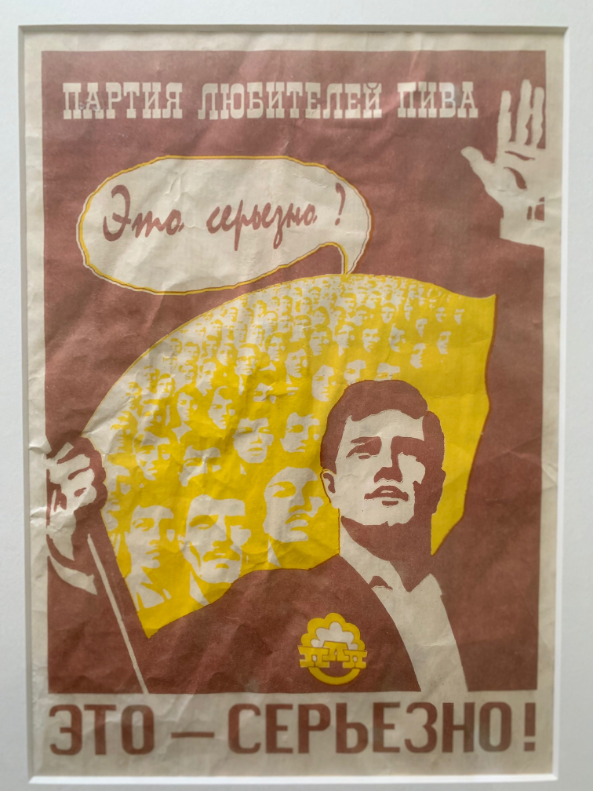Filed Under: Print > Political advertising > 1995 poster for “The Beer Lovers’ Party.” Is this serious? This is serious!”
1995 poster for “The Beer Lovers’ Party.” Is this serious? This is serious!”

Beer Lovers' Party: "Is this serious?" "This is serious!"
The short-lived “Beer Lovers’ Party” (formed 1993, dissolved 1998) embodies a peculiar moment of dynamism in post-Soviet politics, when parties formed around a contradictory binary: an exuberant desire to be involved in politics combined with an equally fierce loathing for all available political options. Dmitri Shostakov and political scientist—and -technologist—Konstantin Kolachev formed the Beer Lovers’ Party in 1993 after becoming frustrated with their attempts to get elected to national government.
Kolachev had previously tried to form the Progress Party in 1993 with engineer and People’s Freedom Party (1990-2023) politician Vadim Lukashevich. According to Kolachev, after he and Shostakov ran into each other on a particularly disappointing day, they commiserated about the state of politics over a beer, leading to the idea that a party organized around loving beer could garner popular approval. They quickly put together a press release and faxed it to major media outlets. Later, they were shocked to find themselves on the evening news, as Channel 1 reported that the Beer Lovers’ Party had held a congress and elected Shostakov as party leader. Both Shostakov and Kolachev insist they had not, at that point, heard of a similar party that had formed in Poland in 1990, led by satirist Janusz Rewiński.
In response to media attention, Shostakov and Kolachev mounted an aggressive advertising campaign using posters clearly referring to the Soviet avant-garde, featuring slogans like “Not the worst party! A great party! A party unlike any other!” (Ne samaia plokhaia partiia. Otlichnaia partiia! Partiia, otlichnaia ot vsekh). Other publicity tactics included a memorable acronym designed to reach the broader public, along with multiple press conferences to which journalists were lured with beer occasionally provided by the Party’s donors and sponsors. The official anthem of the Beer Lovers’ Party was a hymn written by Valerii Shapovalov that sounded much like a generic drinking song.
In 1995, the Beer Lovers’ Party formally ran for the State Duma with the support of multiple entrepreneurs, and somewhat more serious slogans. However, they did not accumulate the 5% of the vote needed to place a representative in the Duma, despite receiving close to a half-million votes. In form, though not in content, their political and media strategy recalled Vladimir Zhirinovsky’s far-right Liberal-Democratic Party of Russia (LDPR)—that is, it was also an amusing and provocative spectacle meant to address the public directly with humor and indulgence. Yet the Beer Lovers’ Party politics were by no means far-right: indeed, their slogans and appeals were typically progressive. Posters called for an end to poverty and unemployment, for preserving clean air and water (as “the basis of good beer”), and generally situated positive social messages within the organizing motivation of beer-drinking.
One of the Beer Lovers’ Party’s television ads from 1995, for instance, featured a beer enthusiast stopping a militant column of tanks with an appeal to their shared love of beer, suggesting an anti-jingoistic vision of post-Soviet politics that distinguished the Beer Lover’s Party from the famously fascistic and militant LDPR. Yet whereas the Beer Lovers’ Party dissolved in 1998, LDPR survives even today, with approximately 300,000 active supporters in Russia, though it is not clear how long it will persist given the 2022 death of founder and leader Vladimir Zhirinovsky.